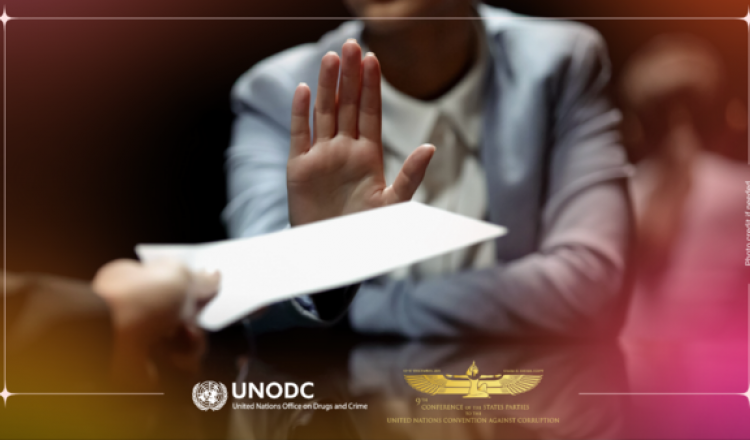How Innovations in Anti-corruption can Build Sustainable Development?
2021-12-09 09:00

How innovations in anti-corruption can build sustainable development
ANGA TIMILSINA-Global Programme Advisor on Anti-Corruption, UNDP
Corruption has attracted increasing attention in the past year. Amid the COVID-19 pandemic, the world witnessed corruption scandals linked with healthcare procurement, vaccine distribution, the management of response and recovery funds, and policymaking. These have led to high levels of distrust, political polarization, and poor perceptions of political integrity.
The recently published Pandora Papers have implicated high-level public officials and private sector companiesand unmasked the hidden owners of offshore companies and secret bank accounts. The International Consortium of Investigative Journalists estimated that money held offshore ranges from US$5.6 trillion to US$32 trillion. According to the International Monetary Fund, tax havens cost governments an estimated US$500-600 billion in lost corporate tax revenue each year.
Anti-corruption is a development financing issue. Resources lost to corruption each year could otherwise be used to finance the ‘SDG Push’ interventions needed to prevent as many as 169 million people from being driven into extreme poverty by 2030.
As corruption continues to reveal itself in more sophisticated forms, we need innovative ways to prevent and address this ever-evolving phenomenon.
Technology for integrity, trust and anti-corruption
UNDP recognizes the huge potential of new technologies for sustainable development, and through its support to inclusive digital transformation, focuses on using digital technologies to solve complex development challenges. Our new UNDP study ‘New Technologies for Sustainable Development: Perspectives on integrity, trust and anti-corruption’ explores the use of artificial intelligence, blockchain technology and big data analytics in the area of anti-corruption, reflecting the support that the ethical and responsible use of technology provides to preventing and tackling corruption.
Digital tools and new technologies have helped to detect, analyze, investigate, predict and monitor corruption. Artificial intelligence is being used in the financial and tax sectors to detect money laundering, tax evasion and fraudulent activities, such as in public procurement in Ukraine. Big data analytics have helped investigative journalists to uncover the biggest corruption scandals such as the recent Pandora Papers. Blockchain technology also has the potential for promoting transparency and security in land registries, as tested in India.
E-governance, open data and other digital tools have also helped to promote effective, accountable and inclusive institutions and governance systems that provide public services for citizens and communities. During the COVID-19 pandemic, smartphone apps have helped healthcare workers to keep track of vaccine supplies and promote transparency and efficiency in emergency health response through the digital Co-WIN platform and database in India; while in Georgia, an AI-powered ‘civil servant’, C-bot, promoted public engagement and provided citizens of Rustavi municipality with information and guidance on services.
With the erosion of public trust and weakened social contract that has exacerbated over the past years, technology offers new and innovative ways for promoting transparency, accountability and integrity, which are critical for re-building public trust and for forging a more inclusive social contract.
However, we recognize it may pose new challenges for policymakers. Our new UNDP study offers recommendations to harness the benefits of technology for integrity, trust and anti-corruption, while minimizing the risks of abuse and misuse. Effective digital governance, including regulation, is necessary to ensure ethics and integrity and safeguard human rights in the use of technology, and ensure that digital transformations are inclusive and people-centred, with a commitment to leaving no one behind.
UNDP’s approach to harnessing the benefits of technology and innovation for anti-corruption efforts
In line with UNDP’s new Strategic Plan (2022-2025), UNDP’s Anti-Corruption for Peaceful and Inclusive Societies (ACPIS) Global Programme is harnessing the benefits of digitalization and innovation in anti-corruption efforts, to maximize the impact of development financing.
This year, we commenced the UNDP Anti-Corruption Innovation Initiative in seven countries in Africa and the Asia-Pacific. In Bangladesh and Nepal, we are institutionalizing digital grievance redress platforms to deliver inclusive and accountable public services. In Sri Lanka and Uganda, we are using data and digital monitoring to tackle illegal environmental practices and promoting integrity and transparency in environmental resource management. In Nigeria and Tanzania, we are using technology to reform public procurement processes. And in Liberia, we are supporting open data monitoring of SDG 16 anti-corruption targets.
To achieve the vision set out by the UN campaign for International Anti-Corruption Day 2021, “Your right, your role: Say no to corruption”, UNDP will continue to work closely with governments, development partners, businesses, civil society and communities to integrate transparency, accountability and anti-corruption measures across UNDP’s six signature solutions and development contexts. UNDP is committed to supporting the rights and responsibilities of all individuals to be united against corruption, towards a fairer world and a more sustainable, resilient and inclusive future.









